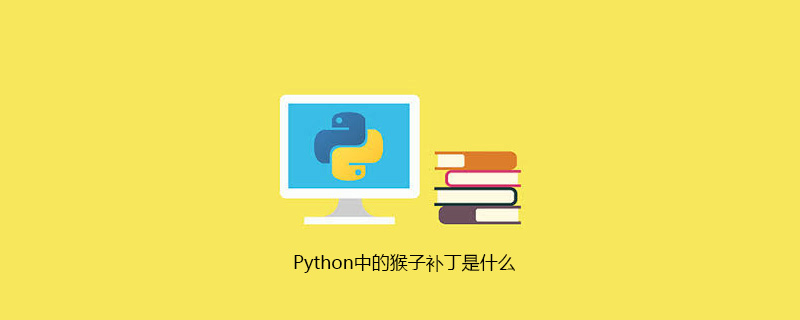Python中的猴子補丁是什麼
- 爱喝马黛茶的安东尼轉載
- 2020-01-04 17:45:503324瀏覽

屬性在運行時的動態替換,叫做猴子補丁(Monkey Patch)。
為什麼叫猴子補丁
屬性的運行時替換和猴子也沒什麼關係,關於猴子補丁的由來網上查到兩種說法:
1.這個字原來為Guerrilla Patch,雜牌軍、遊擊隊,說明這部分不是原裝的,在英文裡guerilla發音和gorllia(猩猩)相似,再後來就寫了monkey(猴子) 。
2.還有一種解釋是說由於這種方式將原來的程式碼弄亂了(messing with it),在英文裡叫monkeying about(頑皮的),所以叫做Monkey Patch。
猴子補丁的叫法有些莫名其妙,只要和「模組運行時替換的功能」對應就行了。
猴子補丁的用法
#1、運行時動態替換模組的方法
stackoverflow上有兩個比較熱的例子,
consider a class that has a method get_data. This method does an external lookup (on a database or web API, for example), and various other methods in the class call it. However, in a unit test, you don't want to depend on the external data source - so you dynamically replace the get_data method with a stub that returns some fixed data.
假設一個類別有一個方法get_data。這個方法做一些外部查詢(如查詢資料庫或Web API等),類別裡面的很多其他方法都呼叫了它。然而,在一個單元測試中,你不想依賴外部資料來源。所以你用啞方法態取代了這個get_data方法,啞方法只會回傳一些測試資料。
另一個例子引用了,Zope wiki上對Monkey Patch解釋:
from SomeOtherProduct.SomeModule import SomeClass
def speak(self):
return "ook ook eee eee eee!"
SomeClass.speak = speak還有一個比較實用的例子,很多程式碼用到import json,後來發現ujson效能更高,如果覺得把每個檔案的import json 改成import ujson as json成本較高,或者說想測試一下用ujson替換json是否符合預期,只需要在入口加上:
import json
import ujson
def monkey_patch_json():
json.__name__ = 'ujson'
json.dumps = ujson.dumps
json.loads = ujson.loads
monkey_patch_json()#2、運行時動態增加模組的方法
這種場景也比較多,例如我們引用團隊通用庫裡的一個模組,又想豐富模組的功能,除了繼承之外也可以考慮用Monkey Patch。
個人感覺Monkey Patch帶了便利的同時也有搞亂原始碼優雅的風險。
PHP中文網,有大量免費的Python影片教學,歡迎大家學習!
本文轉自:https://www.jianshu.com/p/a19f936471e4
以上是Python中的猴子補丁是什麼的詳細內容。更多資訊請關注PHP中文網其他相關文章!

